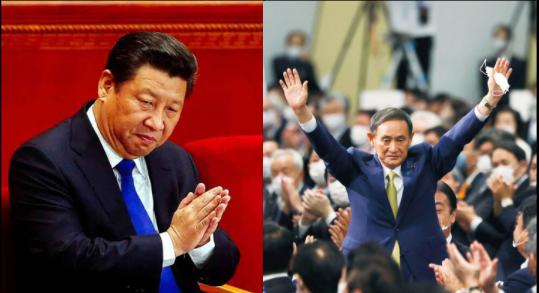The debate around Japanese Prime Minister Shinzo Abe’s succession has been settled, and it seems that China is set for more trouble in Tokyo as the ruling Liberal Democratic Party (LDP) members in Japan have elected Japan’s Chief Cabinet Secretary Yoshihide Suga for the top post. Till now, China believed that Suga’s elevation will steady Sino-Japanese relations. The Chinese media including the State-owned Global Times seem to be done in by Suga’s lack of charisma.
However, Suga’s elevation is no good news for Beijing. And if China thinks that Suga’s lack of charisma would mean a departure from Shinzo Abe’s ‘decoupling from China,’ then it is grossly mistaken. Suga is described as Shinzo Abe’s right-hand man, and therefore, he is likely to implement Abe’s vision of decoupling from China and also tackling the serious security threat posed by Beijing vigorously.
Abe has himself demitted office by renewing Tokyo’s ambitious rivalry with China. First, Abe gave a parting gift to India- the historic Mutual Logistics Support Agreement (MLSA) that will allow Indian and Japanese militaries to access each other’s bases for logistics support, in face of growing Chinese belligerence in the East China Sea (Senkaku Islands) and the Himalayas (Eastern Ladakh) against Japan and India respectively.
And then, Shinzo Abe has signalled a counter-offensive strategy to take on the security threat posed by Beijing. Towards the fag end of his stint as the Japanese Prime Minister, Abe has announced that Tokyo would come up with a plan to deal with missile threats by the end of this year. Abe has also suggested that Tokyo might have to acquire pre-emptive strike capacity to meet the challenges posed by a complex security situation that Japan faces today.
Abe has, therefore, passed on a clear agenda to his loyal successor- do anything to get rid of the Chinese threat. And as such, Yoshihide Suga is expected to meet this challenge.
Even apart from Abe’s towering stature which is expected to define Suga’s China policy, the Japanese PM-elect is himself a China hawk of sorts. Suga may not be as charismatic a leader as Shinzo Abe and he may be seen as an ‘efficient’ bureaucrat, but the incumbent Chief Cabinet Secretary has no love lost for China. A firm believer in ‘Abenomics’, Shinzo Abe’s successor shares the vision of bringing back Japan’s glory and reining in China.
Yoshihide Suga is an advocate of strongly decoupling from China. In an interview in April to Asia Nikkei, he had strongly proposed reducing Japan’s reliance on China. He had said, “In the case of surgical masks, for instance, 70% to 80% of what we have here are made in China. Even with factories in Japan running at full throttle, we still had a mask shortage. When China’s economy shut down, a Japanese automaker was unable to procure parts and had to let a plant sit idle. We need to end a heavy reliance on a single country for a particular product or material.”
Suga had added, “For things that are essential to our everyday life, we need to bring production back to Japan or diversify the location of such manufacturing over several countries.” The Japanese PM-elect is, therefore, going to embark on the same path of incentivising Japanese companies to pack up and leave from China.
Moreover, Suga is expected to lead Japan’s charge against the human rights violations in Hong Kong by the Chinese. He was the one in Abe administration who took on the task of e criticising China over the imposition of the draconian National Security Law in Hong Kong.
When China was brutally robbing Hong Kong of its cherished liberties and freedoms earlier this year, Suga had said, “We are seriously concerned about the decision on Hong Kong by the National People’s Congress despite strong concerns expressed by the international community and the people of Hong Kong, as well as about the current situation in Hong Kong.”
Suga had added, “We will continue to closely follow developments and address the situation in collaboration with other countries concerned,” while maintaining that Hong Kong should prosper in a “stable and democratic” manner.
Suga is, therefore, in sync with the Abe administration’s vigorous China policy over three main agendas- security, economic competition and Chinese human rights violations. Beijing itself is committing a gross miscalculation, by thinking that Suga will pursue a soft China policy due to his lack of charisma.
Suga may not be a fiery leader, but, he has been elected by the ruling LDP with a landslide margin- 377 votes out of 534 votes cast. Given Suga’s popularity, he will not be the same uncharismatic leader after assuming the Prime Minister’s office. And for all we know, Suga might give some real shocks to China contrary to the Dragon’s expectations.
